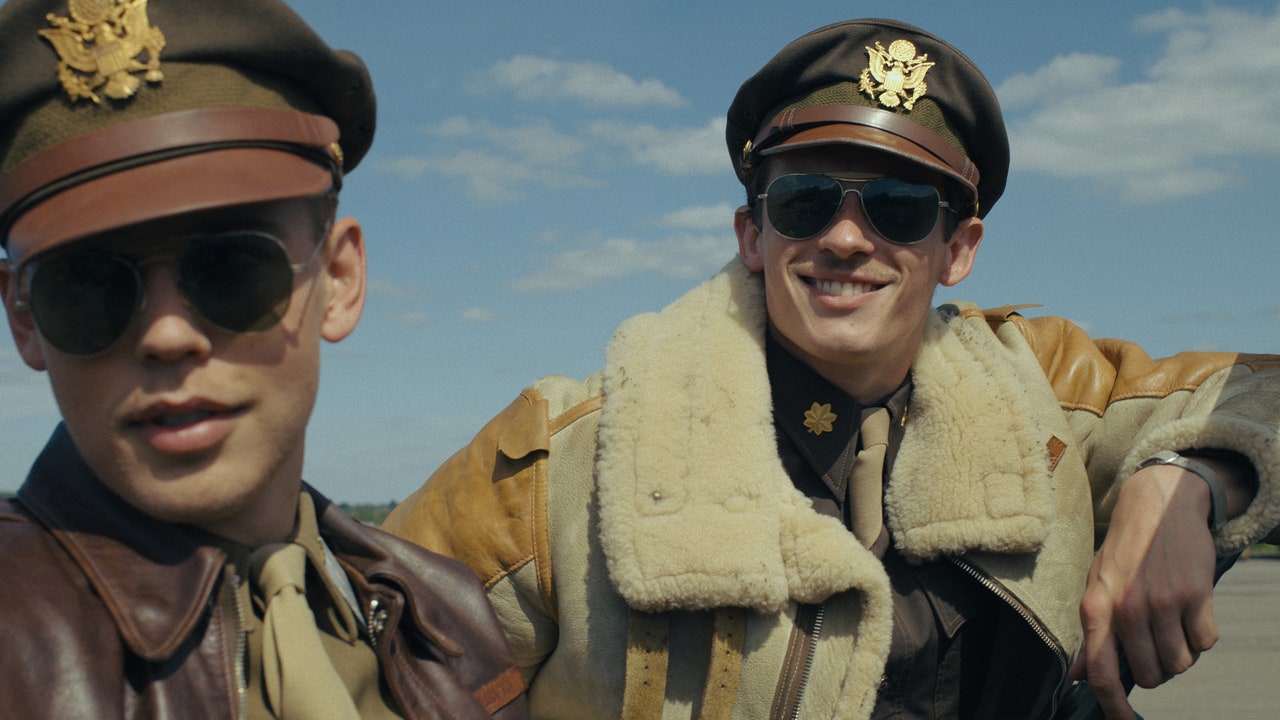Just below Butler and Turner in the cool-guy chain of command is Group Navigator Crosby, played by Anthony Boyle, who provides the series’ voice-over narration and acts as a kind of audience surrogate. These are the guys you, the viewer, imagine putting your life in the hands of. You know it’s going to be hard, nearly impossible, but they’re going to get you through it. Unless, of course you’re Barry Keoghan and you have to go film Saltburn, which means your character is definitely not making it home.
The problem this particular theater of combat presents from a television standpoint is two-fold. First, when flying these planes, all the actor’s faces are obscured by oxygen masks, which makes it a little difficult to figure out who just died. The second is that by now, dropping bombs on people has become a staple of the American way of war that developed some unsavory and less than valorous connotations as the American History Extended Universe evolved. Masters of the Air solves this problem by showing us that—even if, today, it’s never been more bloodless or risk-free to kill people with airplanes—during World War II, your chances of landing one of these flying fortresses safely after taking off and doing one these bombing raids made Russian roulette look like a good bet. That, and the show doesn’t spend too much time pondering the morality of something like Dresden.
The depictions of aerial combat are intense and terrifying, but somewhat repetitive—in each instance, the bombers fly in tight formation until they hit a wall of flak, those who make through that fog of exploding metal are picked apart by Messerschmitts, and only a few are able to actually drop their bombs on target. That being said, I’d like to give a special shout-out to the “ball turret gunners” of the Flying Fortresses, whose job—being locked into a giant glass basketball on the bottom of an airplane in negative-30-degree temperatures, while said plane is being riddled with .50-caliber bullets and also on fire—now occupies a new “worst nightmare possible” slot in my mind.
The unbelievably high rate of attrition for pilots and their crews becomes both a major plotline and something the writers of the show have to deal with. In the second half of the series, after one particularly disastrous bombing raid sees every single one of our boys shot down over Germany, the show changes tracks in a number of ways. First we’re allowed to think our number one boy Buck Cleven died in combat for an episode. Then our guys Buck and Bucky find themselves reunited in a Stalag—coincidentally, the same one Steve McQueen’s character breaks out of in The Great Escape, another fictionalized but fact-based WWII story. Then, outside of German captivity, we’re introduced to Maj. Robert “Rosie” Rosenthal (Nate Mann), a new ace pilot from—you guessed it—da mean streets of Brooklyn. There’s also a Spy Who Loved Me plotline featuring Crosby canoodling with a quirked-up OSS agent (Bel Powley), and then the second-to-last episode introduces another entirely new crop of handsome, cool guys—the Tuskegee Airmen, Black pilots who contributed to the war effort on behalf of an officially racist, segregated US military, and found themselves in many respects more free in occupied Europe than they were back home, a story worthy of its own AppleTV series that feels a bit tacked-on here.
For America, World War II remains the most important historical crucible—the origin story of our belief in ourselves as the rightful inheritors of the world. For guys of my generation, it’s also how we judge ourselves as men. Are we as tough or good as our grandfathers? Most people would say Probably not. However, there’s a certain self-effacing narcissism in this kind of generational rubbernecking; when faced with the ultimate trade and its ultimate practice, we all think No thanks, but as Mark Ames suggested on a recent episode of his podcast The War Nerd, deeper down, we’d all like to imagine that we’re the protagonists of reality, that we’d be the one to not only survive combat but maybe gain some cynical, hard-earned and bittersweet life experience and then go on to write Catch-22. After all, behind every fear lies a certain secret wish. In this case, it’s a desire to look good, wear cool jackets, have fun with your friends, get laid, and then die in some spectacular, unimaginable way. Masters of the Air gratified this fantasy exactly as we’ve come to expect.

